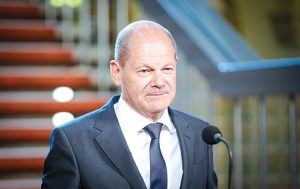Bloomberg
Chancellor Olaf Scholz signature policy to boost Germany’s military prowess is struggling to get off the ground.
Back in February, the 63-year-old chancellor vowed to end decades of military underfunding with a debt-financed 100 billion euro ($105 billion) defense package, dismantling the tenets on which German foreign policy long-rested since World War II.
But since then Scholz has been
criticised for being slow on weapons supplies to the government in Kyiv and holding up a European Union ban on Russian energy imports.
Now even his defense upgrade is facing headwinds. In addition to the votes from his center-left coalition government, Scholz needs the backing of the main opposition conservatives to reach the two-thirds majority required to bake the new funding into the German constitution. But a vote had to be postponed because the parties could not agree on how the money should be spent. It’s not clear when talks will be rescheduled.
While the fund itself is probably not under threat, it may not pass the lower house of parliament, or Bundestag, until the start of next month at the earliest. Anything that looks like weakness or division among the nations supporting Ukraine will offer encouragement to Vladimir Putin.
Scholz defended his plans in the Bundestag, and called for unity. “The special fund guarantees the freedom and security of our country during this difficult time,†he said. “It is also a clear message to friends and allies: Yes, we mean it seriously when we talk about the duty of assistance and collective defense.â€
Tensions within Scholz’s own coalition became apparent during a hearing of the parliamentary defense committee. Marcus Faber, a lawmaker from the pro-business FDP, who questioned the chancellor on his Ukraine policy, stormed out of room — and headed straight to the first TV camera.
“Unfortunately, many of our questions have not been answered,†he said. Faber later apologised for his outburst, and his party is clearly backing the coalition plan for the special fund. The fund is meant to supplement an increase in German annual defense spending to more than 2% of gross domestic product, and would be paid for outside of the regular budget.
The Greens, who have been emboldened by gains in regional elections while Scholz’s own Socialist Democrat party suffered losses, want the package to include cyber defense, which would mean a small fraction of the money would go to the foreign ministry, rather than the defense ministry.
 The Gulf Time Newspaper One of the finest business newspapers in the UAE brought to you by our professional writers and editors.
The Gulf Time Newspaper One of the finest business newspapers in the UAE brought to you by our professional writers and editors.
